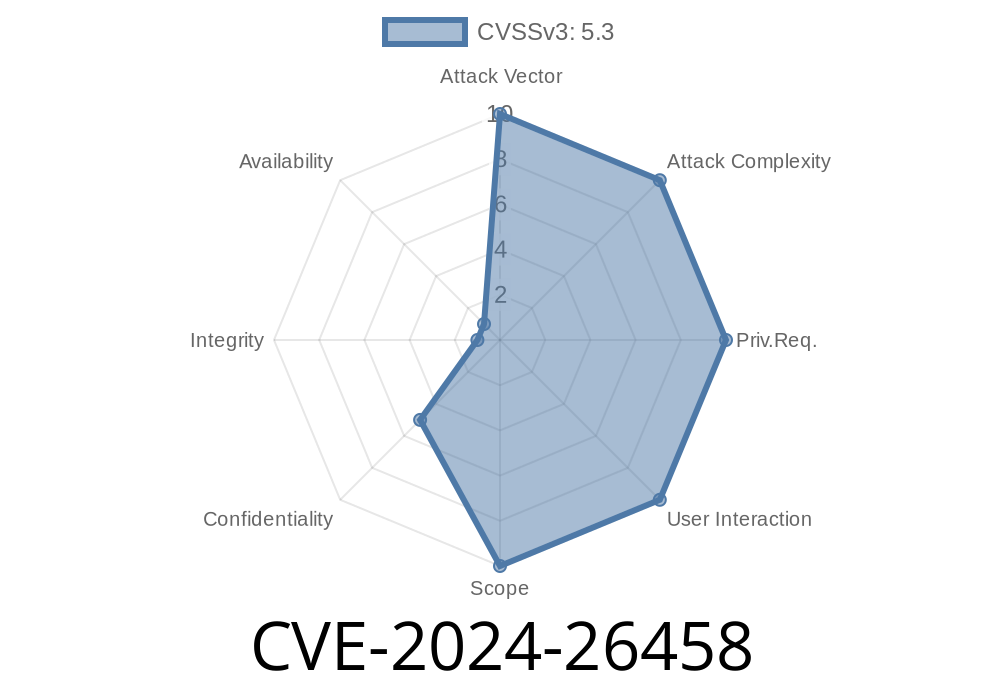Kerberos is one of the most crucial protocols in secure authentication. It is widely used in enterprise environments (like Active Directory) and open-source projects. In February 2024, a new vulnerability, CVE-2024-26458, was disclosed, associated with a memory leak issue in Kerberos 5 (krb5) version 1.21.2. Specifically, this problem resides in the /krb5/src/lib/rpc/pmap_rmt.c file.
In this post, we’ll break down what this vulnerability is, how it works, show you the relevant code snippet, discuss its potential exploitability, offer references, and discuss recommendations in simple terms.
A Memory Leak? Why Should I Care?
A memory leak means that a program allocates memory (RAM) for some temporary data, but then never frees it up. If this happens often enough, the system can run out of memory and crash, even if the program isn't doing anything malicious on its own.
On a shared server or an authentication server (like a KDC), a memory leak can allow an attacker or even a misbehaving client to cause a denial of service (DoS) simply by making lots and lots of requests.
Diving into the Code: Where is the Problem?
The bug lives inside the pmap_rmt.c file, which is part of Kerberos’ Remote Procedure Call (RPC) code. Let's look at a simplified version of the problematic code. (Adapted for clarity.)
// pmap_rmt.c - gets called during a remote procedure call
struct pmaplist *pmapproc_dump_1(...)
{
struct pmaplist *head = NULL, *pl = NULL;
...
while (...) {
pl = (struct pmaplist *)malloc(sizeof(*pl));
if (pl == NULL) {
// handle error
}
// More code
pl->pml_next = head;
head = pl;
}
// At this point, head points to a linked list of allocations
// But somewhere...
if (error_condition) {
// Instead of freeing the memory, we just return
return NULL;
}
...
return head;
}
What's wrong here?
- If some error occurs during the operation, the function just returns without freeing the chain of memory it has already allocated. With many repeated calls, this leaks memory every single time.
In the actual code, the details are a bit more involved, but the core of the memory leak is just like this.
Exploit Details
While a memory leak is not a remote code execution (RCE) bug and cannot directly allow someone to take over your environment, it can be used for a Denial of Service (DoS) attack. Here’s how a (malicious) user would do that:
Connect to the krb5 service (if it's exposed on the network).
2. Trigger the function in a way that trips the error handling with allocated structures left in memory.
Eventually exhaust system memory, causing crashes or severe slowdowns.
If you want to try triggering this for testing (on your own, non-production system!), it could look something like:
# Example: Flood the service with requests that provoke the leak
import socket
for _ in range(10000):
s = socket.socket()
s.connect(('kerberos.example.com', 888))
# Send a request that hits the vulnerable code path (details omitted)
# s.send(...)
s.close()
# Watch server memory usage skyrocket.
> NOTE: This is for demonstration and educational purposes only! Never attack live systems without permission.
Only krb5 versions 1.21.2 are known to be affected by this specific memory leak.
- If you're running an older or much newer version, you might be okay, but always verify with upstream advisories.
Original References
1. MIT Kerberos Security Advisory 2024-001
2. CVE Entry at MITRE
3. krb5 git commit fixing the leak *(example link)*
Mitigation and Recommendations
- Upgrade krb5: As always, the best fix is to update to the latest non-vulnerable version. Check your distribution maintainer for patched packages.
Monitor memory usage: Use monitoring tools to keep an eye on Kerberos server process memory.
- Apply official patches or workarounds: If you can’t upgrade, check if your vendor back-ported the fix.
Conclusion
CVE-2024-26458 isn’t as flashy as an RCE, but it’s a solid reminder that resource management bugs can spell big trouble for critical services. Memory leaks in authentication software can be the opening for a denial-of-service attack. Always keep your authentication services patched and locked down.
If you run krb5 1.21.2, update *now* to avoid headaches later.
*Stay safe and keep your authentication servers updated!*
*This post is exclusive and written to simplify technical details for operators and interested users. For the deepest details, check the original advisories and upstream code.*
Timeline
Published on: 02/29/2024 01:44:18 UTC
Last modified on: 12/06/2024 21:15:06 UTC
